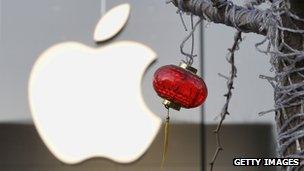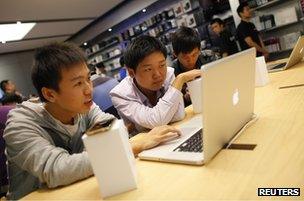Apple and China - time for a new PR strategy?
- Published
- comments

For the past five years, two things have remained constant about Apple - an inexorable rise in sales and profits, and a steely determination to control its message in the media. But, just as the company basks in the admiration of the financial world after last week's amazing results, is customer concern about where and how all those iPads and iPhones are made going to force a change in its PR strategy?
Let me explain how that strategy works. Its fundamental principle is that Apple will only communicate with the outside world on its terms and to its timetable, and that means at exquisitely stage-managed events in California.
So Apple has never attended exhibitions like the Consumer Electronics Show or Europe's IFA, and a few years ago the firm even severed links with the annual Macworld conference because it did not want to have to fit in with someone else's schedule.
Apple has long been a company where all power is centralised in Cupertino, California, and after Steve Jobs' return from exile to what had become a leaky organisation, he made sure that everyone understood that talking to the media or any outsider without his permission was a sacking offence.
For a while Jobs himself did give the occasional interview, but certainly for the past five years it has been virtually impossible for journalists to ask direct questions to anyone from Apple, except at product launches.
And even when there is an opportunity to talk, the company's PR minders are determined not to let reporters go "off topic" - just look at what happens in this 2007 interview when Benjamin Cohen from Channel 4 News asks the wrong question, external.
I joked once to a group of Apple PR people that it would be easier to get into North Korea than to get proper access to the firm. They laughed nervously and mentioned that there was a popular T-shirt at the company store with the slogan "I work for Apple in Cupertino, That's all I can tell you..."
But, hey, I hear you say, the company is free to conduct itself with the media any way it chooses, and it's worked pretty well so far. And that is absolutely true. But what happens when American customers and politicians start reading about what seem to be the appalling conditions in which your products are made?

There is unease about the conditions in which iPhones and iPads are made
There have been a number of exposes over the past 18 months of working conditions at Apple's Chinese factories.
The most startling I've heard came not from a journalist but an actor, Mike Daisey. His monologue telling of how an obsession with all things Apple ended up with him visiting China and finding workers, some apparently as young as 13, putting in 15-hour shifts, was performed recently on the radio programme This American Life.
More seriously for Apple, the New York Times has run a series of articles, external over the past week examining why America's most successful company can't manufacture its products in the United States, and then taking a closer look at conditions at its suppliers.
To be fair to Apple, it has for some years been publishing annual reports detailing the inspections it carries out at its suppliers, and this year it has released a list naming the companies, external.
But the latest audit, external shows that at 93 factories, workers put in more than the 60-hour weekly limit prescribed by the American firm, and a third of all the plants inspected did not have sufficient measures to prevent employees suffering occupational injuries.
Now, calls for consumers to start boycotting iPhones or iPads are unlikely to have much of an impact. After all, just about every major electronics brand manufactures in China, and it is far from clear that if you buy a rival phone or tablet it will have been made under better conditions.
It seems clear too that, however miserable the work in the vast factories making every kind of gadget, it is lifting millions of Chinese out of rural poverty.
But in an election year, US politicians may have some tough questions about why a company with $100bn in the bank cannot afford to invest a little more of it at home, creating much needed jobs.
Which brings us back to Apple's PR strategy. Tim Cook, the man who took over from Steve Jobs, told staff in an internal email:

China is also Apple's biggest single potential market
"We are defined by our values. Unfortunately some people are questioning Apple's values today... We care about every worker in our worldwide supply chain... Any suggestion that we don't care is patently false and offensive to us."
But so far Mr Cook has shown no sign of wanting to be any more open with the press or public about this or any other issue than his predecessor. The next time he speaks in public will probably be at the launch of the iPad 3.
But he may find that, once he's extolled the new device's awesomeness, he faces questions about whether the way it was manufactured accords with Apple's values.
UPDATE 15:31 GMT
Apple has been in touch, seeking to correct the impression I give in this post that there has been nothing said in public about conditions at its suppliers in China. The company pointed me towards two interviews given by Tim Cook in recent days to Reuters, external and the Wall Street Journal, external about this very issue.
Perhaps a subtle shift in Apple's PR strategy under its new leader is already under way.